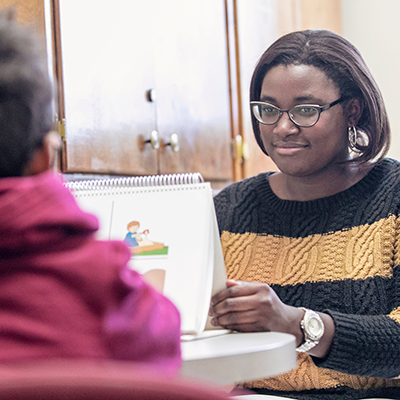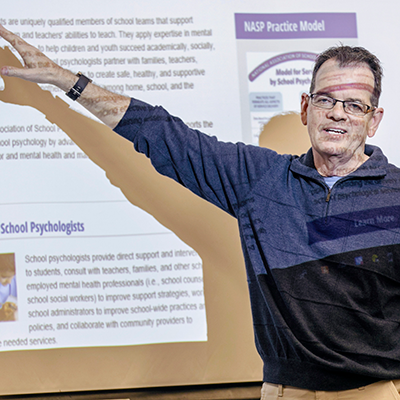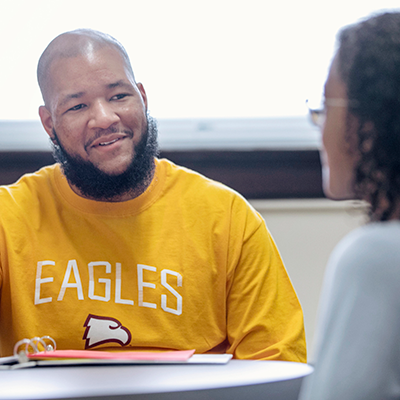Master's and Specialist Degrees
The Winthrop School Psychology Program is primarily designed to prepare practitioners who are competent to provide a full range of school psychological services including consultation, behavioral intervention, psychoeducational assessment, research, program planning/evaluation and counseling. Students are prepared to work with diverse clients from infancy to young adulthood, including those with low-incidence disabilities, and with families, teachers and others in the schools and community.
This program only accepts applications once per year for the fall term.
Graduate Program Director:
Dr. Giancarlo Anselmo
anselmog@winthrop.edu
803/323-2635

After Graduation
100 percent employment rate in the field within three months of graduation over the past 10 years (many students had job offers before they graduated).

Accreditation
The combined M.S./S.S.P. program is fully approved by the National Association of School Psychologists (NASP) and South Carolina Department of Education.

Quality Program
100 percent of students graduating over the past 20 years have passed the national Praxis examination in school psychology.
The Winthrop School Psychology Program is a three-year, full-time graduate training sequence leading to the Specialist in School Psychology (S.S.P.) degree. Although an interim Master of Science (M.S.) degree is awarded at the end of the second year, students admitted to the program are expected to complete the full three-year training program.
Time to completion: 3 years
Total Credits: 72
Format: Campus-based
Admissions are normally limited to twelve students per year, with study beginning
in the fall semester only.
The curriculum is organized into four areas: Psychological and Educational Foundations, Psychoeducational Methods, Traineeship and Internship.
Psychological and Educational Foundations. Coursework covers the theoretical foundations of the science of human behavior and the foundations of education. Psychological foundation areas include human development, child and adolescent psychopathology, and psychological and educational research and statistics. Educational foundation areas include exceptional children, multicultural issues, academic intervention, and organization and operations of schools. This area also includes professional ethics and the history and foundations of professional school psychology.
Psychoeducational Methods. Characterized by a competency-based approach and emphasis on data-based decision-making, coursework in this area involves the acquisition and application of professional knowledge and skills needed to function successfully as a school psychologist. Courses cover diverse models and methods of psychoeducational assessment, behavioral assessment and intervention, counseling and mental health services, and consultation/indirect services to schools and families.
Traineeship. In conjunction with psychoeducational methods courses, students complete a two day per week, paid 450-hour traineeship in the schools during the second year of the program. This experience includes close supervision by both faculty and field supervisors and includes specific objectives that address school psychology competencies in such areas as assessment, counseling, behavioral assessment and intervention, and consultation.
Internship. During the third year, students complete a paid 1200-hour supervised internship, at least 600 hours of which must be in the schools. Internships in nearby diverse rural, suburban, and urban settings allow students to practice and integrate the full range of school psychological services under supervision of credentialed faculty and field supervisors.
Prerequisites to admission are 12 hours of prior undergraduate or graduate coursework in four areas:
General Psychology
Human Development (child development or child psychology may be acceptable alternatives)
Experimental Psychology or Research Methods
Statistics
While the bulk of these prerequisite areas must be completed prior to admission to the program, one or two may be taken after an applicant is admitted.
Master of Science/Specialist in School Psychology: January 15 for Fall Admission
Applications are only accepted one time per year for the Fall term.
Admissions to the program are quite competitive (typically about one in four applicants is admitted).
The admissions decisions are focused on the selection of applicants who we believe have the greatest potential to be successful school psychologists based on undergraduate GPA, test scores, demonstrated knowledge of the field, some experience with children, and strong recommendations.
Note: All admission materials must be received by the Graduate Studies office before an application will be reviewed.
Application requirements for the School Psychology program include:
The online Graduate Studies application with the non-refundable application fee.
Official transcript(s) from all institutions attended for undergraduate and graduate coursework. Transcripts must be sent directly to Winthrop's Graduate Studies office from the issuing institution(s).
Three recommendations. In the online admissions application, you will be asked to provide names and e-mail addresses of three individuals from whom you have requested recommendations. These three people will then receive an e-mail instructing them to complete the online recommendation form. It's a good idea to talk with these individuals ahead of time so they will be expecting the e-mail when they receive it.
Professional resume.
Personal statement.
Supplemental questionnaire.
Personal interview.
Our graduates go on to careers in a wide variety of school psychology fields. Here are some directions our students have gone in:
Public school districts
Charter schools
Private schools
National Defense Schools
Mental health, disability, and independent practice service settings